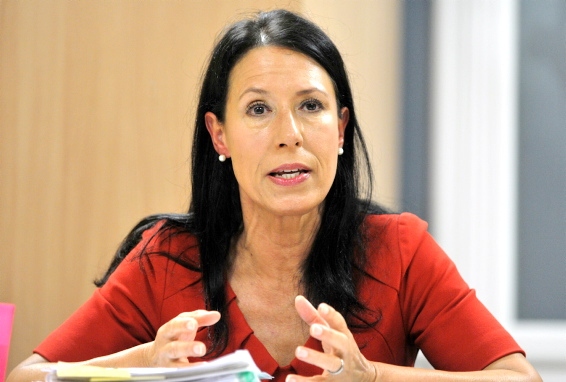Why it’s wrong to meddle with the Human Rights Act
Reporter: Debbie Abrahams
Date published: 11 August 2015

Debbie Abrahams, Oldham East and Saddleworth MP
THE Oldham East and Saddleworth MP opposes Government plans to abolish the Human Rights Act and replace it with a Bill of Rights. Here she sets out her case for retaining the act
The High Court judgement on the hacking of the phones of eight high profile actors and celebrities made history earlier this year when the publisher of the Daily and Sunday Mirror was ordered to pay compensation many times more than previous awards where the right for private life has been violated.
Shobna Gulati, Coronation Street’s Sunita Alahan, and originally from Oldham, was one of those affected and was said by the judge to have suffered “very substantially indeed”. Shobna was awarded £117,500.
However 25 years ago when another actor, Gorden Kaye, the Huddersfield star of ‘Allo, ‘Allo, lay in hospital with head injuries after a serious road accident and a reporter took photographs of him after brain surgery, and he tried to sue the journalist’s paper Sunday Sport, he lost his case in the Court of Appeal. At that time he was told there was no remedy in English law for an invasion of privacy.
In 1998 the then Labour government introduced the Human Rights Act (HRA), and this is what has enabled Shobna, Sadie Frost and the other litigants to make their case. The HRA meant that the European Convention of Human Rights (ECHR) was finally adopted into UK law nearly 50 years after it was drafted.
The ECHR is a regional treaty of the Universal Declaration of Human Rights. After the Second World War when countries came together as the United Nations to say “never again”, they agreed a set of universal standards of decency for all human beings.
These standards are intended to protect every one of us. They include our rights to life, not to be enslaved or forced into labour, to religious freedom, to a fair trial and not to be discriminated against.
The HRA has achieved much already. It has held the State to account for spying on us; safeguarded our soldiers; and supported peaceful protest. It has helped rape victims, defended domestic violence sufferers and guarded against slavery. It has protected those in care, shielded press freedom and protected people from press intrusion into their personal lives.
But it is under threat.
The current government has designs to abolish it. They want to replace it with a Bill of Rights. They argue that the HRA is a villains’ charter, a ludicrous claim since there has been no shift in defendants’ rights under HRA. They may also suggest that this is about stopping the European Courts of Human Rights (ECtHR) interfering in UK law. Again, another falsehood. The HRA only requires our courts to “take into account” judgments from ECtHR; they are not bound by them.
And it is Article 46 of the ECHR which requires the UK to respond to judgments from the European Courts not the HRA. Repealing the HRA would have no effect whatsoever. The only thing that would achieve that would be by pulling out of the Council of Europe (CoE).
In spite of its name the CoE is separate from the European Union. It was also set up just after the Second World War and promotes co-operation between European countries on human rights, the rule of law and democratic development.
It was Sir Winston Churchill, a former MP for Oldham, who spoke of the need for a “Council of Europe” in 1946!
And now it is a Conservative government who may be pulling out of it.
In a meeting at the Houses of Parliament in May, which I attended, Philippe Sands QC, professor of law at University College London and of human rights chambers, Matrix, told an invited audience that as a member of the Commission who examined the feasibility of a British Bill of Rights, three out of the four Tory members wanted to withdraw from the ECHR and one of the aims of their bill would be to facilitate this.
Very alarmingly, he reported that the draft bill has proposed three categories of human beings with different sets of rights: if you’re a British citizen all rights apply to you, if you’re a EU national, some rights apply and if you’re a “foreigner” even fewer rights apply to you. Such an approach is totally inconsistent with the principle of fundamental and universal human rights. Since the HRA is embedded into devolution arrangements, this would have consequences for our nation states as well.
Fortunately I don’t believe all Conservative MPs are wedded to what is a very slippery slope. At our meeting we discussed the importance of not just a cross political party campaign but a movement with civil society to force this government to think again. We must use every measure possible to prevent the HRA from being abolished. The consequences of this for Britain and the world are grave indeed.
You can join Liberty’s campaign to Save Our Human Rights Act at:
www.liberty-human-rights.org.uk/campaigning/save-our-human-rights-act
Most Viewed News Stories
- 1Milan Bar in Lees and The Bank at Delph close doors with immediate effect
- 2Latics announce retained list
- 3Punch perfect Kyle is Oldham's latest national boxing champ
- 4Attack on shop worker filmed and posted on Snapchat results in jail sentence for Oldham man
- 5Second-hand music, books and media shop opens in Mossley




